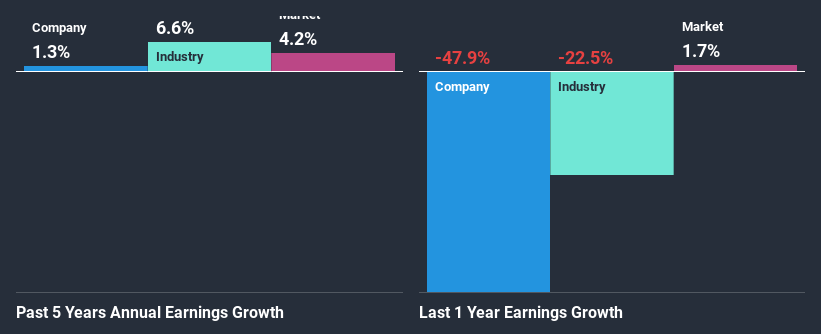- South Korea
- /
- Communications
- /
- KOSDAQ:A100590
Is The Market Rewarding Mercury Corporation (KOSDAQ:100590) With A Negative Sentiment As A Result Of Its Mixed Fundamentals?
Mercury (KOSDAQ:100590) has had a rough three months with its share price down 13%. It is possible that the markets have ignored the company's differing financials and decided to lean-in to the negative sentiment. Long-term fundamentals are usually what drive market outcomes, so it's worth paying close attention. In this article, we decided to focus on Mercury's ROE.
Return on equity or ROE is a key measure used to assess how efficiently a company's management is utilizing the company's capital. Put another way, it reveals the company's success at turning shareholder investments into profits.
Check out our latest analysis for Mercury
How To Calculate Return On Equity?
Return on equity can be calculated by using the formula:
Return on Equity = Net Profit (from continuing operations) ÷ Shareholders' Equity
So, based on the above formula, the ROE for Mercury is:
3.5% = ₩2.6b ÷ ₩74b (Based on the trailing twelve months to September 2020).
The 'return' is the income the business earned over the last year. So, this means that for every ₩1 of its shareholder's investments, the company generates a profit of ₩0.03.
Why Is ROE Important For Earnings Growth?
So far, we've learned that ROE is a measure of a company's profitability. We now need to evaluate how much profit the company reinvests or "retains" for future growth which then gives us an idea about the growth potential of the company. Assuming all else is equal, companies that have both a higher return on equity and higher profit retention are usually the ones that have a higher growth rate when compared to companies that don't have the same features.
A Side By Side comparison of Mercury's Earnings Growth And 3.5% ROE
It is quite clear that Mercury's ROE is rather low. Even when compared to the industry average of 6.5%, the ROE figure is pretty disappointing. Therefore, Mercury's flat earnings over the past five years can possibly be explained by the low ROE amongst other factors.
As a next step, we compared Mercury's net income growth with the industry and were disappointed to see that the company's growth is lower than the industry average growth of 6.6% in the same period.

Earnings growth is a huge factor in stock valuation. It’s important for an investor to know whether the market has priced in the company's expected earnings growth (or decline). Doing so will help them establish if the stock's future looks promising or ominous. If you're wondering about Mercury's's valuation, check out this gauge of its price-to-earnings ratio, as compared to its industry.
Is Mercury Making Efficient Use Of Its Profits?
Summary
On the whole, we feel that the performance shown by Mercury can be open to many interpretations. While the company does have a high rate of reinvestment, the low ROE means that all that reinvestment is not reaping any benefit to its investors, and moreover, its having a negative impact on the earnings growth. Up till now, we've only made a short study of the company's growth data. To gain further insights into Mercury's past profit growth, check out this visualization of past earnings, revenue and cash flows.
If you decide to trade Mercury, use the lowest-cost* platform that is rated #1 Overall by Barron’s, Interactive Brokers. Trade stocks, options, futures, forex, bonds and funds on 135 markets, all from a single integrated account. Promoted
New: Manage All Your Stock Portfolios in One Place
We've created the ultimate portfolio companion for stock investors, and it's free.
• Connect an unlimited number of Portfolios and see your total in one currency
• Be alerted to new Warning Signs or Risks via email or mobile
• Track the Fair Value of your stocks
This article by Simply Wall St is general in nature. It does not constitute a recommendation to buy or sell any stock, and does not take account of your objectives, or your financial situation. We aim to bring you long-term focused analysis driven by fundamental data. Note that our analysis may not factor in the latest price-sensitive company announcements or qualitative material. Simply Wall St has no position in any stocks mentioned.
*Interactive Brokers Rated Lowest Cost Broker by StockBrokers.com Annual Online Review 2020
Have feedback on this article? Concerned about the content? Get in touch with us directly. Alternatively, email editorial-team (at) simplywallst.com.
About KOSDAQ:A100590
Mercury
Manufactures and markets communications equipment and optical fiber cables in Korea.
Adequate balance sheet and slightly overvalued.
Market Insights
Community Narratives



